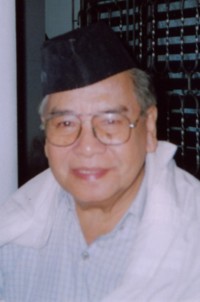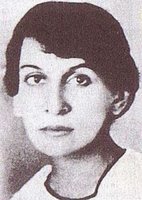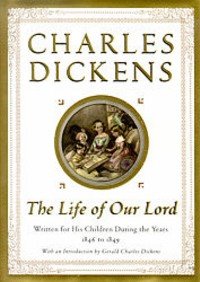
This morning, I attended a seminar on China's economy held in Berjaya Times Square Hotel's Convention Centre in Kuala Lumpur. The 3-hour public lecture delivered by Professor Justin Lin Yifu (
picture) was really comprehensive and in-depth ranging from growth rate, income and wealth distribution, currency management, rural-urban divide, trade, banking, international relations and many other themes.
Professor Justin Lin, although coming from a communist country and is himself a close adviser to the top leadership of China's central government and the Communist Party of China, is also very frank and honest in critically assessing the failures, limitations, shortcomings and inadequacies of the fastest-growing economy of the world, including maldistrubtion of income and wealth between urban and rural areas as well as between the rich and poor.

According to his resume circulated among the 700 particpants, the Taiwan-born Professor Justin Lin holds a PhD in Economics from the University of Chigago and is the founder and director of China's most influential economic think-tank, China Centre for Economic Research at Beijing University. He is also the first Chinese economist invited by Cambridge University's Marshall Lectures to talk about China's economy.
To be frank, even though I am a former politician who used to be a public speaker, I still admire his public speaking skill which enabled him to deliver the 3-hour lecture without looking at any prepared text. His presentation was clear, coherent, systematic, professional and simple enough for laymen to follow.

Earlier, before the public lecture began, I met up Tan Sri Lim Guan Teik (
picture) again over coffee. The former President of the Associated Chinese Chambers of Commerce and Industry of Malaysia (ACCCIM) and me know each quite well for many years as a common friend of Pak Said Zahari.
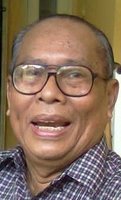
Like Pak Said, Tan Sri was also one of the many victims of repression accross the Causeway in the 1963
Operation Cold Store. He was then a progressive student leader of the now defunct Nanyang University in Singapore. Pak Said (
picture) used to tell me that he learnt Mandarin from people like Tan Sri while under detention and it was he who taught Tan Sri and other detainees from the Nanyang University
Bahasa Melayu.

As a rule, I do not usually like to 'polish shoes' for rich men or women but I must make an exception to the rule in the case of Tan Sri. He certainly belongs to the rare breed of successful and scandal-free businessman who always respect intellectuals. During the 1997-1998 Asian Financial Crisis, his secretary called me several times to say Tan Sri enjoyed my commentaries published in
Sin Chew Jit Poh because the articles provided alternative perspectives to the crisis.
He never forgets his old friends like the late Usman Awang and Pak Said Zahari and he always make it a point to attend Pak Said's simple
Hari Raya open house once a year. When we met this morning, the first question he asked me was Pak Said's state of health.
Despite his many business concerns and connections, he is never afraid of speaking up as a social critic if and when necessary on issues of public interest. For example, in 2001, he publicly opposed MCA's takeover of
Nanyang Siang Pau and
China Press. Just before we went into the conference hall for the public lecture, he whispered to me:"Yong An,when the Q-&-A session begins, shoot some sharp questions to stimulate everyone's minds. I know you can." I did.
 The Star today reported Home Minister Mohd Radzi Sheikh Ahmad (picture) as saying that allowing Lelaki Komunis 'Terakhir' to be shown is "like allowing a film portraying Osama Bin Laden as a humble and charitable man to be screened in the United States". It is another half-past-six statement made by yet another setengah-masak politico in the tradition of Saigon SOBs.
The Star today reported Home Minister Mohd Radzi Sheikh Ahmad (picture) as saying that allowing Lelaki Komunis 'Terakhir' to be shown is "like allowing a film portraying Osama Bin Laden as a humble and charitable man to be screened in the United States". It is another half-past-six statement made by yet another setengah-masak politico in the tradition of Saigon SOBs. As Chin Peng does not even appear in the film, how can he be portrayed as "a humble and charitable man"? And comparing Chin Peng with Osama bin Laden is even more stupid because it shows the setengah-masak minister can't even distinguish between terrorism and wars of national liberation in the aftermath of World War II which happened not only in Malaya, but also in many other ex-colonies like Indonesia, Vietnam and Cuba.
As Chin Peng does not even appear in the film, how can he be portrayed as "a humble and charitable man"? And comparing Chin Peng with Osama bin Laden is even more stupid because it shows the setengah-masak minister can't even distinguish between terrorism and wars of national liberation in the aftermath of World War II which happened not only in Malaya, but also in many other ex-colonies like Indonesia, Vietnam and Cuba. Would Mohd Radzi dare to publicly compare Ho Chi Minh, Sukarno, Dr. Mohamad Hatta or Fidel Castro to Osama, even though Ho Chi Minh was also responsible for the founding of the Communist Party of Malaya, as the first modern anti-colonial political movement in Malaya, in a workers' quarters of a rubber plantation in Negeri Sembilan's Kuala Pilah on 30 April 1930?
Would Mohd Radzi dare to publicly compare Ho Chi Minh, Sukarno, Dr. Mohamad Hatta or Fidel Castro to Osama, even though Ho Chi Minh was also responsible for the founding of the Communist Party of Malaya, as the first modern anti-colonial political movement in Malaya, in a workers' quarters of a rubber plantation in Negeri Sembilan's Kuala Pilah on 30 April 1930?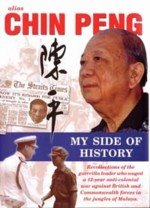 The government of the United States has never signed any peace treaty or accords with Osama bin Laden or Al Qaeda. But, the Governments of Malaysia and Thailand did officially sign the Haadyai Peace Accords with the Communist Party of Malaya, of which Chin Peng is a signatory, on 2 December 1989. The Communist Party of Malaya had also had treaty relations with British military command at Fort Canning, Singapore in 1941 as well as Allies' South East Asia Command (SEAC) in 1943 and it was recognised as a legitimate negotiating partner in the 1955 Baling Peace Talk and the 1988-1989 Tripartite Truce Talks involving Bangkok as well as Kuala Lumpur.
The government of the United States has never signed any peace treaty or accords with Osama bin Laden or Al Qaeda. But, the Governments of Malaysia and Thailand did officially sign the Haadyai Peace Accords with the Communist Party of Malaya, of which Chin Peng is a signatory, on 2 December 1989. The Communist Party of Malaya had also had treaty relations with British military command at Fort Canning, Singapore in 1941 as well as Allies' South East Asia Command (SEAC) in 1943 and it was recognised as a legitimate negotiating partner in the 1955 Baling Peace Talk and the 1988-1989 Tripartite Truce Talks involving Bangkok as well as Kuala Lumpur. I really do not think the governments of Britain, Australia and Singapore would allow Osama to conduct archival research at Kew's Public Record Office, Cambridge University's Rhodes House Library, Imperial War Museum and Australian War Memorial, or to address the Institute of South East Asian Studies. Canberra's Australian National University (ANU) would never invite Osama as a Visiting Fellow.
I really do not think the governments of Britain, Australia and Singapore would allow Osama to conduct archival research at Kew's Public Record Office, Cambridge University's Rhodes House Library, Imperial War Museum and Australian War Memorial, or to address the Institute of South East Asian Studies. Canberra's Australian National University (ANU) would never invite Osama as a Visiting Fellow.





 A: Believe me, the man in the picture (right) is absolutely evil ... Go home tonight and check whether he has been hiding under your bed or inside the store room in your house ...
A: Believe me, the man in the picture (right) is absolutely evil ... Go home tonight and check whether he has been hiding under your bed or inside the store room in your house ...












